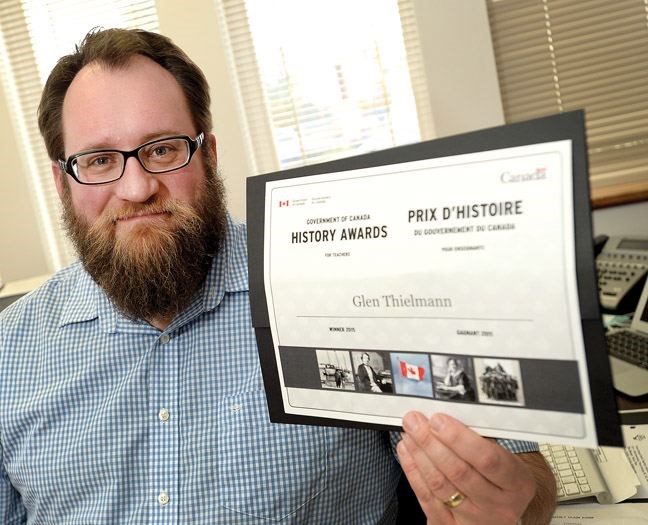A Prince George teacher is one of 20 educators across the country to get a 2015 Government of Canada History Award.
Glen Thielmann was recognized for an assignment he's been developing for the past eight years.
It's called the Echo project, a term that Thielmann said refers to the students he teaches: the millennial generation.
"It also refers in a metaphorical sense, calling across some expanse and expecting a reply back," he said.
The idea is for students to learn about Canadian identity reaching back several generations with research through primary sources - interviews, journals, photographs and more.
"If you want to break a culture you break two generations of the storytelling," said the DP Todd Secondary social studies teacher.
"We need elders to tell youngsters stories. Culture doesn't transmit unless you have that two generation gap that gets severed with every generation."
Personalizing history makes for powerful learning moments.
"Students are a lot more engaged when their identity is on the line, when there's something personal about the work that they're doing," he said.
"The students have amazing things locked up in their house and they know amazing people," said Thielmann, fanning several student projects on his desk: thick duotangs that weave student words with black and white photos, diagrams, interviews and more.
One student spoke to grandparents of the Great Depression and for a week tried to embody that lifestyle. She cooked simple meals using her grandmother's recipe from the time, recreated old photographs of the family playing instruments for entertainment.
"These photos become a living connection," he said, allowing students to gain "historical empathy" and have "visceral connection" with a piece of the past.
The student played a piece of sheet music from that time period for Thielmann's class. And, her grandfather gifted her the family violin. "It was a rite of passage for her," he said. It's these unintentional outcomes and experiences, that Thielmann finds most satisfying.
"It's a joy as a teacher to find out," he said, showing examples of his favourite projects online, using the new Mac he bought with the $2,000 prize money.
After the district went to single-platform with Windows, he no longer has the Apple software he prefers for its flexibility and design features.
One was from last year by Josiah Fisher, who interviewed a family friend and Second World War veteran.
"Mr. Thielmann made the Echo project in a way that went beyond just trying to make sure that the kids learned the curriculum," Fisher said by email.
"I enjoy just listening to Mr. Thielmann teach because he is very engaging and willing to go the extra mile for his students."
The approach also encourages critical discussions around how history is presented in textbooks and websites.
While they're often wonderful resources, it also presents " a highly curated set of documents or image or perspectives," Thielmann said.
The primary research also presents a single perspective for students to critique, and also gives them an opportunity to touch on history that may not come up in the typical course outline or investigate with more depth.
Several projects have prompted discussion around residential schools. Thielmann has seen powerful stories, but often students submit them quietly.
"The Truth and Reconciliation Commission I think has made asking those questions a lot easier because some of the old timers have had a chance to steel up the nerve to share their stories."
Then there was the student who is a descendant of William Beatty, a British ship's surgeon during the Battle of Trafalgar, on Oct. 21, 1805, a decisive British naval victory over the Franco-Spanish fleet.
The Echo project prompted family members to bring out a desk he used, called the Beatty box because it folded up.
"This is a significant piece of history and it's in someone's basement in Prince George," he said.



